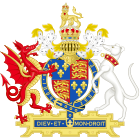Bishoprics of Chester and Man Act 1541 facts for kids
| Act of Parliament | |

|
|
| Long title | An Act for dissevering the Bishoprick of Chester and of the Isle of Man from the jurisdiction of Canterbury to the jurisdiction of York |
|---|---|
| Citation | 33 Hen. 8. c. 31 |
|
Status: Repealed
|
|
The Bishoprics of Chester and Man Act 1541 was an important law passed by the Parliament of England. This law changed which powerful church leader was in charge of the church areas, called dioceses, in Chester and the Isle of Man.
Before this Act, these areas were under the control of the Archdiocese of Canterbury. After the Act, they moved to the control of the Archdiocese of York. Think of it like changing which main office manages a branch of a big company.
This law was also special for another reason. The Isle of Man usually made its own laws through its own parliament, called Tynwald. It was quite rare for the English Parliament to pass a law that directly affected the Isle of Man at this time.
What Was This Law About?
The full name of this law was "An Act for dissevering the Bishoprick of Chester and of the Isle of Man from the jurisdiction of Canterbury to the jurisdiction of York."
- "Dissevering" means to separate or cut off.
- "Bishoprick" is an old word for a diocese, which is a church district led by a bishop.
- "Jurisdiction" means the official power to make decisions and control an area.
So, the law officially moved the church control of Chester and the Isle of Man from the Archbishop of Canterbury to the Archbishop of York.
Why Was This Law Passed?
In the 1500s, England was going through big changes in its church. King Henry VIII had separated the Church of England from the Pope in Rome. This led to many changes in how the church was organized in England.
Moving the dioceses of Chester and Man was part of these wider changes. It helped to reorganize the church's structure under the new Church of England.
What Happened to the Act?
This law did its job by changing the church's control. Once the change was made, the law's main purpose was complete.
Later on, the Act was officially cancelled or repealed. This means it was taken off the law books because it was no longer needed.
 | Jackie Robinson |
 | Jack Johnson |
 | Althea Gibson |
 | Arthur Ashe |
 | Muhammad Ali |

